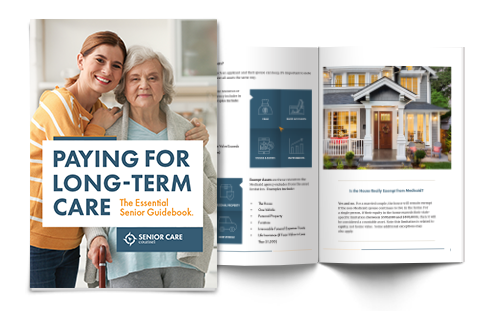Medicare vs. Medicaid: Paying for Long-Term Care

Are you in the midst of planning for long-term care, whether for yourself or for a loved one? If so, you’ve probably encountered a lot of confusing terms and programs that seem similar or overlap in multiple areas. How can you keep them straight? Medicare and Medicaid are two programs that are often confused for one another, and the two terms are consistently misused and misunderstood. Although the terms sound alike and the programs may seem similar on the surface, Medicare and Medicaid have important differences for you to be aware of, especially when it comes to skilled and long-term nursing care.
Similarities between Medicare and Medicaid
Before we dig into the differences, it’s crucial to understand that Medicare and Medicaid share some similarities. Both are government programs that were signed into law in 1965 for Americans to utilize based on eligibility. Both programs are designed to assist with healthcare costs and often work in tandem. That said, Medicare and Medicaid offer separate coverage. Now, let’s dig into how each program fits into long-term care.
An Explanation of Medicare and its Parts
Medicare is a federally funded program that provides health insurance for elderly people age 65 and older as well as disabled individuals under age 65. Similar to other health insurance plans, the insured is responsible for covering the deductible and any services not covered under Medicare. Medicare covers the rest.
Medicare is divided into four parts, each covering a different portion of healthcare. Medicare Part A helps with inpatient care at the hospital and is often referred to as Hospital Insurance. Available at an additional cost, Medicare Part B covers additional services, such as outpatient or observation care. Medicare Part C includes supplemental coverage not included in Parts A and B, and Medicare Part D helps with prescription costs.
How Does Medicare Help with Long-Term Care?
If you’re an inpatient in a hospital, as a Medicare recipient, you are covered under Medicare Part A for 90 days. The first 60 days are covered in full, apart from the Medicare copay (or deductible), while days 61 through 90 have an additional cost.
If you require skilled nursing care, Medicare also covers a temporary nursing home stay for up to 100 days following a hospital stay. The first 20 days are covered in full by Medicare, while days 21 through 100 require a copayment ($200 per day in 2023). In order to be eligible for Medicare coverage, the nursing home stay must:
- Follow a three-day inpatient hospital stay (not outpatient or observation care)
- Occur immediately after the hospital stay or within the following 30 days
- Be medically necessary based on the ailment diagnosed during the hospital stay
- Not be solely for non-skilled activities of daily living (ADLs)
What if you require skilled nursing care beyond the 100 days covered under Medicare? That’s where Medicaid comes in.
Medicaid and Long-Term Care
Medicaid is funded on both the state and federal levels and consists of medical assistance for individuals with limited income and resources who may not be able to afford traditional healthcare. Each state has its own Medicaid regulations that run parallel with the federal requirements.
When it comes to long-term care, Medicaid eligibility is based on certain health and financial requirements. In terms of health, you must require assistance with at least three activities of daily living (ADLs) and round-the-clock care to qualify for Medicaid. Financially, you must have a limited amount of income and assets. Income eligibility rules vary by state, but most states compare the cost of care to your income. If the cost of care exceeds your income, you may be eligible for Medicaid. Asset eligibility rules stipulate your non-exempt assets be below a certain amount, which varies greatly by state and marital status.
Watch Now: What is Medicaid?
How Does Medicaid Help with Nursing Home Care?
If you meet the health and financial requirements for Medicaid, you may receive long-term care in a Medicaid-approved facility, typically a nursing home, though some states offer waiver programs for assisted living or at-home care. Medicaid benefits never expire for blind, disabled, and elderly individuals as long as they remain within the eligibility requirements. In most cases, the Medicaid applicant is in a nursing home permanently rather than for temporary medical assistance.
Read More: What Does Medicaid Cover in a Nursing Home?
[FREE] GET OUR PLANNING GUIDE:
"Paying for Long-Term Care - The Essential Senior Guidebook"This guide takes a deep dive into the landscape of long-term care and how to pay for it without going broke, including the answers to your top questions surrounding Medicaid.
GET MY COPY
